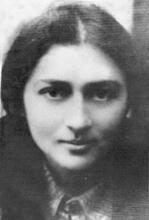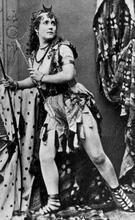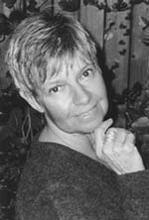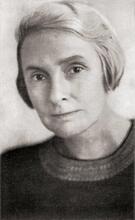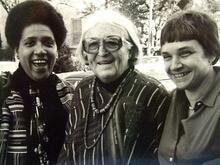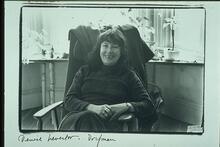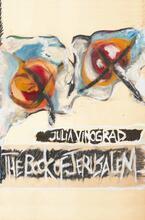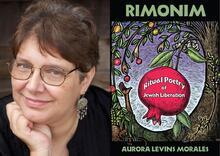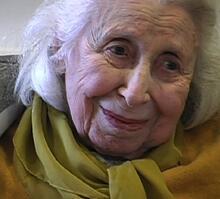Julia Vinograd
Julia Vinograd was a prolific poet known for her vibrant presence in the Berkeley community. Despite facing challenges such as polio and epilepsy, Vinograd's passion for poetry thrived. Vinograd supported herself through disability payments and street sales of her books. Often adorned in eccentric attire, she earned the nickname "The Bubble Lady" for her involvement in protests, where she diffused tension by blowing soap bubbles. Although Vinograd was raised without religious education, she engaged significantly with Judaism in a series of poems published as The Book of Jerusalem. She received the American Book Award in 1985, but she remained relatively unknown until her death in 2018. A documentary about her life should come out in 2025.
Early Life and Family
Julia Shalett Vinograd was born on December 11, 1943, in Berkeley, California, to Sherna and Jerome Vinograd. Her mother taught English and her father was a biochemist. At the age of six, Vinograd was diagnosed with polio, only months before the vaccine became available. Concern for Julia’s mobility motivated the family’s move from the hills of Berkeley to flat Pasadena, where her father took up a teaching post at the California Institute of Technology. Though Vinograd made a good recovery, polio left her with a leg brace and a limping gait. She was also afflicted with grand mal epilepsy. Her childhood invalid state was surely a factor in her so earnestly seeking an interior life through books, and later, through poetry.
Vinograd went to a girls’ high school in Pasadena. She returned to Berkeley in 1962 to attend the University of California, graduating with a BA in 1965, then earned an MFA from the Iowa Writers’ Workshop.
In 1967 Vinograd returned again to Berkeley, where she spent the rest of her life, writing and hawking her books of poetry and actively engaging in the world of open poetry readings.
A Hardscrabble Existence
Vinograd’s epilepsy qualified her for disability payments (SSI), which enabled her to live as a full-time poet. She described SSI as “the closest America comes to supporting the arts” (conversation with the author, 2004). She supplemented this slender income with in-person sales of her books in cafés, at poetry events, on the street, in restaurants—any place she was permitted to. A significant portion of her sales were to tourists, who were thrilled to buy real “street people” poetry from a genuine Telegraph Avenue eccentric. Her books usually feature a picture of her in her “weird and proud” costume. (She always wore a button on her hat that read “Weird and Proud,” lest her unusual appearance seem less than deliberate.) These photographs enhanced the books’ appeal as souvenirs of an encounter with her as a virtual ambassador of street life. Her publisher, Bruce Isaacson of Zeitgeist Press, estimates that she sold upwards of 150,000 copies in this manner over the years, earning a much-needed and undeclared supplement to her meagre SSI payments.
Vinograd lived in cheap residential hotels not far from the Berkeley campus for her entire independent adult life. Her true domicile, however, was the Telegraph Avenue Café Mediterraneum (sic), where she held court, as she recounts in her poem “On Hearing the Café Mediterraneum is About to Close” (Styrofoam Ghosts):
And I live here.
The chairs know us, the tables know us.
The blue-and-white striped awning knows us.
The tinted glass menu knows us by name.
I never knew the med had an owner
I thought it grew here.
I thought a magician poured boiling coffee
into the black earth on a full moon
and the med grew.
And Berkeley grew around the med.
And the streets became paved
and it was good.
How can the med close? Can the moon close?
The Bubble Lady
Vinograd was a public persona and a performer. She usually wore a black and gold velvet beret with a heavy tassel, a long black gown, and striped socks à la Wicked Witch of the West. She sported rings, from which plastic eyeballs stared, on most of her fingers. Not infrequently she made the street her stage by filling the air with soap-bubbles.
Vinograd earned the nickname “The Bubble Lady” in 1969, when she became involved in protests by street people and activists who had seized land slated to become housing for University of California-Berkeley students and declared it a “People’s Park.” Vinograd repeatedly took part in the protests, and the soap bubbles she blew at riot police defused many a tense encounter. These acts of poetic and nonviolent daring were long-remembered idyllic episodes in a conflict sometimes characterized by violence and vandalism. She appears, blowing bubbles, in the 1976 People’s Park Mural by Berkeley artists Osha Neumann and Brian Thiele, which chronicles the social turmoil on Telegraph Avenue. The soap bubbles became a standard feature of her presence as a performer.
The Book of Jerusalem
Vinograd was raised without religious education. She described her father as “an atheist Zionist,” while her mother “made up her own religion” (Loranger, 2013). Yet Vinograd’s work engaged Jewish themes, intermittently but consistently. Her ambivalence about, and fascination with, Jewish tradition, are tellingly expressed in her poem “For Rebbe Shlomo Carlebach.” (This poem appeared in her 1986-1996 collection book Cannibal Carnival. Carlebach’s sexual misconduct would not become general knowledge until Lilith magazine’s 1998 March article “Rabbi Shlomo Carlebach’s Shadow Side.”)
I’m not sure why I never wrote you a poem:
maybe I didn’t believe
how much I believed in you.
You were a rebbe with a guitar
who gave wild concerts and study groups.
You had the face of a sacred pig
and were rumored to sleep with the girls.
This was in the sixties,
everyone was a sacred something
and I didn’t like the study groups.
All the stories were out of Chagall
and the Brothers Grimm, they all started
“This is what the Bal Shem Tov,
blessed be his name,
told to Rebbe Nachman
who told the rebbe of my village
about what god did when the cow fell down the well.”
That wasn’t my god.
My god looked out the window
of a lonely furnished room
and could not sleep for what he saw.
Vinograd’s engagement with Judaism played out in a series of poems that first saw light in 1984 as The Book Of Jerusalem. In her seminal 1985 interview with Dana Sachs, Vinograd rejected the notion she had any agenda and described herself entirely surprised by the poems: “They [the initial poems of the cycle] happened in about two and a half months. I don’t know where they came from. Yes, I’m Jewish but . . .I don’t know tradition. . . . .It came from nowhere.”
The Book of Jerusalem was published in a smaller, initial form by the Bench Press of Oakland, California. In the 1985 Sachs interview, Vinograd declined to acknowledge a personal agenda or message regarding Judaism or feminism in this work, but the book does indeed address both Judaism and female identity, with considerable depth and humor. These lines from the poem “Jerusalem and the Day of Atonement” (The Book of Jerusalem) suggest the complex views to which Vinograd gave mordant, witty expression:
Jerusalem decided to fast this year
for the Day of Atonement.
“You’ll give up blood?” the Lord asked her,
not quite believing.
“No, but for a whole day,” Jerusalem answered,
her voice quivering
like the outline of a mirage
that will not quench thirst
“I’ll give up mirrors.
I feed on my beauty you know.
Without it I won’t know who I am
and I won’t remember my sins;
they’ll all crawl away
like glittering sandsnakes
looking for another name to nest in.
I’ll be atoned.”
Here Vinograd is targeting religion in general as a source of violent fanaticism. She scrupulously avoids taking any side in Middle East politics. In this poem cycle, Jerusalem, flirting with God, is the human longing for transcendence, and bloodshed the tragic outcome of such impossible desires.
The poems of the Jerusalem cycle show Vinograd writing with dizzying facility in high literary (though still lucid) style. This, as much as the religious content, made the Jerusalem poems less appealing to her usual audience. When she was unable to sell copies of The Book of Jerusalem to the usual tourists and café idlers, she adopted the tactic of slipping her later additions to the cycle into her more crowd-pleasing books, a few at a time. The complete Jerusalem poems have now been collected in a single large volume brought out in 2023 by the Zeitgeist Press.
Poet of the People
Julia Vinograd has largely flown below the radar of literary critics and academics, and reviews of her books have focused more on her larger-than-life personality than on the character of her writings.
Vinograd was in some ways the product of her times, particularly the 1960s. Her costume alone defined her as a hippie, an identity borne out by her disinterest in limiting self-definitions, religious or political. Her reluctance to describe herself as a Jewish or a woman writer aligns with this tendency. She placed the highest value on individuality, which is why so many of her poems are portraits of extraordinary and eccentric individuals. The mere titles of a few of her poems, such as “Spare Changers,” “Fierce Old Women,” “The Goth Girls,” and “Saxplayer in the Cold Night,” show her keen and sympathetic eye for all the exceptional people of the street. Her surreal poetic portraits of street people and café personalities merit comparison with their contemporary cartoon equivalents from the pen of Robert Crumb.
Vinograd often boasted that she wrote “poetry for people who hate poetry.” That is, she wrote in an easily appreciated, conversational style that she honed over a lifetime of participation in opening poetry readings, where the loudest applause was often accorded to poems that verged on stand-up comedy. Subtle utterance would not have been welcome in the world of “poetry slams.”
Vinograd the Ascetic
In a bohemian world where alcohol and marijuana, at the very least, were commonly consumed, and inebriation was widely regarded as a poetic privilege, if not a credential, Vinograd was singularly abstemious, and her verses contain no praises of wine.
This most social of poets, who knew everyone and whom everyone knew, also remained single and solitary. She, whose poems are fuller of descriptions of other people than any written since Whitman, is also a supreme poet of loneliness, for which she makes music her characteristic and poignant metaphor. She does this in her poem, “A Symphony for Broken Instruments” (A Symphony for Broken Instruments), when she describes a composer who is the spectral proprietor of a magical curiosity shop:
“The music of the spheres,” he said
“would have to be written on broken instruments;
after all, it was written for us.”
In other words, the music that expresses the divine, when matched to our condition, accessible to us, is scored for broken and abandoned instruments.
Television is also a recurrent metaphor for the emotional predicament of this poet so sensitively social and yet in some ways entirely isolated. As she says in her poem “Lonely” (The Cutting Edge),
Lonely’s never been arrested
but he’s been in jail. He gets around.
Lonely owns a television and we’re all on it.
Sometimes he turns off the sound
and sits for hours in the dark
just watching us open and close our mouths.
Recognition
In 1985, Vinograd’s The Book of Jerusalem won an American Book Award from the Before Columbus Foundation. The City of Berkeley awarded her a Poetry Lifetime Achievement Award, and Mayor Tom Bates declared June 4, 2004 “Julia Vinograd Day.” Yet she remains relatively unknown outside of the Berkeley area. The news articles about her, and the reviews of her work, are almost entirely Californian and local. There is no biography of Julia Vinograd, and the few outlines available online, from Wikipedia or in the introductions to book reviews, are unreliable in the fine detail. The best sources presently available are her interviews. A documentary film, Julia Vinograd, Between Spirit and Stone, by Ken Paul Rosenthal, should be released in 2025.
Julia Vinograd died of colon cancer on December 5, 2018, six days before her 75th birthday.
Selected Works by Julia Vinograd
Sixty-eight books chapbooks by Julia Vinograd were published between 1967 and 2019, most of them no longer in print. They include:
Styrofoam Ghosts. Las Vegas, NV: Zeitgeist Press, 1993.
Cannibal Carnival. Las Vegas, NV: Zeitgeist Press, 1996.
The Cutting Edge. Las Vegas, NV: Zeitgeist Press, 1998.
A Symphony for Broken Instruments. Las Vegas, NV: Zeitgeist Press, 2019.
The Book of Jerusalem, Universal Edition. Las Vegas, NV: Zeitgeist Press, 2024.
A comprehensive selection of her poetry is available:
A Symphony for Broken Instruments, Selected and Unpublished Poems. Las Vegas, NV: Zeitgeist Press, 2019.
Dalzell, Tom. “Julia Vinograd and her visual creativity.” Quirky Berkeley, July 1, 2017. https://quirkyberkeley.com/julia-vinograd-and-her-visual-creativity/
Gans, Lydia. “The Poet, the Police, and the Spirit of the Sixties.” Street Spirit, April 6, 2015. https://thestreetspirit.org/2015/04/06/the-poet-the-police-and-the-spirit-of-the-sixties/
Loranger, Richard. “Necessity, Survival, and Sideways Thinking: An Interview with Julia Vinograd.” Great Weather For Media, October 29, 2013. https://www.greatweatherformedia.com/greatweatherformediacom/necessity-survival-and-sideways-thinking-an-interview-with-julia-vinograd
Moose, Anne. Berkeley U.S.A. Berkeley, CA: Alternative Press 1981.
Rosenthal, Ken Paul. Julia Vinograd, Between Spirit and Stone, documentary film in production. https://www.betweenspiritandstonethefilm.com/#
Sachs, Dana. “Julia Vinograd: Something Strange and Beautiful.” J.A.C.O.B.'s LETTER, Summer 1985, pp. 3-6.
Whiting, Sam. “Julia Vinograd, Berkeley poet known as the Bubble Lady, dies.” San Francisco Chronicle, December 9, 2018. https://www.sfchronicle.com/bayarea/article/Julia-Vinograd-Berkeley-poet-known-as-the-Bubble-13449034.php



